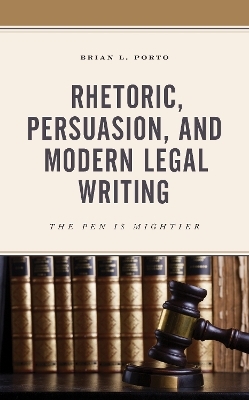
Rhetoric, Persuasion, and Modern Legal Writing
The Pen Is Mightier
Seiten
2020
Lexington Books (Verlag)
978-1-4985-6891-3 (ISBN)
Lexington Books (Verlag)
978-1-4985-6891-3 (ISBN)
Focusing on the opinion writing of Justices Holmes, Jackson, Black, Brennan, and Scalia, this book assesses the influence of rhetorical techniques traceable to ancient Greece on some of the most iconic opinions in Supreme Court history.
Classical, rhetorical techniques can enhance the persuasiveness of Supreme Court opinions by making their language clear, lively, and memorable. This book focuses on three techniques, "invention" (creation of arguments), "arrangement" (organization), and "style" (word choice) in the work of Oliver Wendell Holmes, Jr., Robert Jackson, Hugo Black, William Brennan, and Antonin Scalia, respectively. The justices featured here contributed to the Court’s rhetorical legacy in different ways, but all five rejected the magisterial opinion style of the eighteenth and nineteenth centuries in favor of a more personal and conversational format. Because of this, their opinions have endured, at least in part, and while modern speakers may not recall the authors, they understand and embrace the ideas expressed in their legal writings and continue to apply it to current debates. This book can be used by practicing lawyers as well as academics not only to study legal writing techniques but also as a tool to improve their own.
Classical, rhetorical techniques can enhance the persuasiveness of Supreme Court opinions by making their language clear, lively, and memorable. This book focuses on three techniques, "invention" (creation of arguments), "arrangement" (organization), and "style" (word choice) in the work of Oliver Wendell Holmes, Jr., Robert Jackson, Hugo Black, William Brennan, and Antonin Scalia, respectively. The justices featured here contributed to the Court’s rhetorical legacy in different ways, but all five rejected the magisterial opinion style of the eighteenth and nineteenth centuries in favor of a more personal and conversational format. Because of this, their opinions have endured, at least in part, and while modern speakers may not recall the authors, they understand and embrace the ideas expressed in their legal writings and continue to apply it to current debates. This book can be used by practicing lawyers as well as academics not only to study legal writing techniques but also as a tool to improve their own.
Brian L. Porto is professor of law at Vermont Law School
Chapter One: The Power Of Rhetoric In Supreme Court Opinions
Chapter Two: The Rhetorical Roots of Persuasive Legal Writing
Chapter Three: Oliver Wendell Holmes, Jr.: Literary Lion
Chapter Four: Robert Jackson: Country Lawyer with A Golden Pen
Chapter Five: Hugo Black: Master Of Simplicity
Chapter Six: William Brennan: Bridge-Builder
Chapter Seven: Antonin Scalia: Originalist in Style Too
Chapter Eight: Rhetoric And The Supreme Court: Past, Present, And Future
| Erscheinungsdatum | 02.01.2020 |
|---|---|
| Verlagsort | Lanham, MD |
| Sprache | englisch |
| Maße | 159 x 233 mm |
| Gewicht | 490 g |
| Themenwelt | Geisteswissenschaften ► Sprach- / Literaturwissenschaft ► Literaturwissenschaft |
| Recht / Steuern ► Allgemeines / Lexika | |
| Recht / Steuern ► EU / Internationales Recht | |
| Recht / Steuern ► Privatrecht / Bürgerliches Recht ► Berufs-/Gebührenrecht | |
| ISBN-10 | 1-4985-6891-2 / 1498568912 |
| ISBN-13 | 978-1-4985-6891-3 / 9781498568913 |
| Zustand | Neuware |
| Haben Sie eine Frage zum Produkt? |
Mehr entdecken
aus dem Bereich
aus dem Bereich
Buch | Softcover (2020)
Beuth (Verlag)
CHF 27,85


